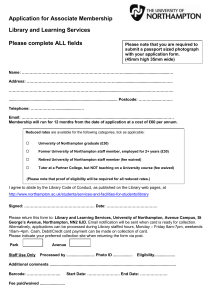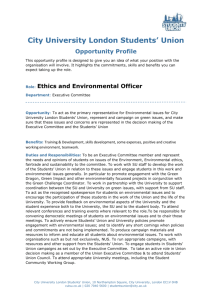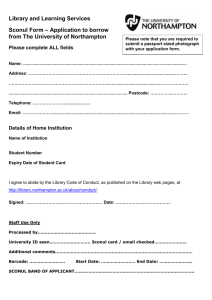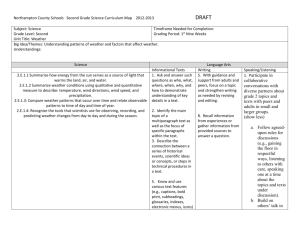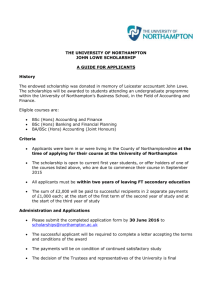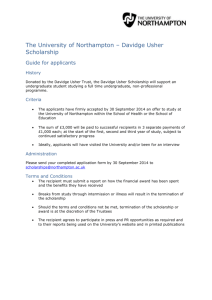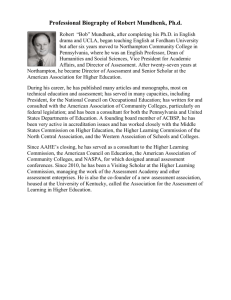programme of multidisciplinary training
advertisement
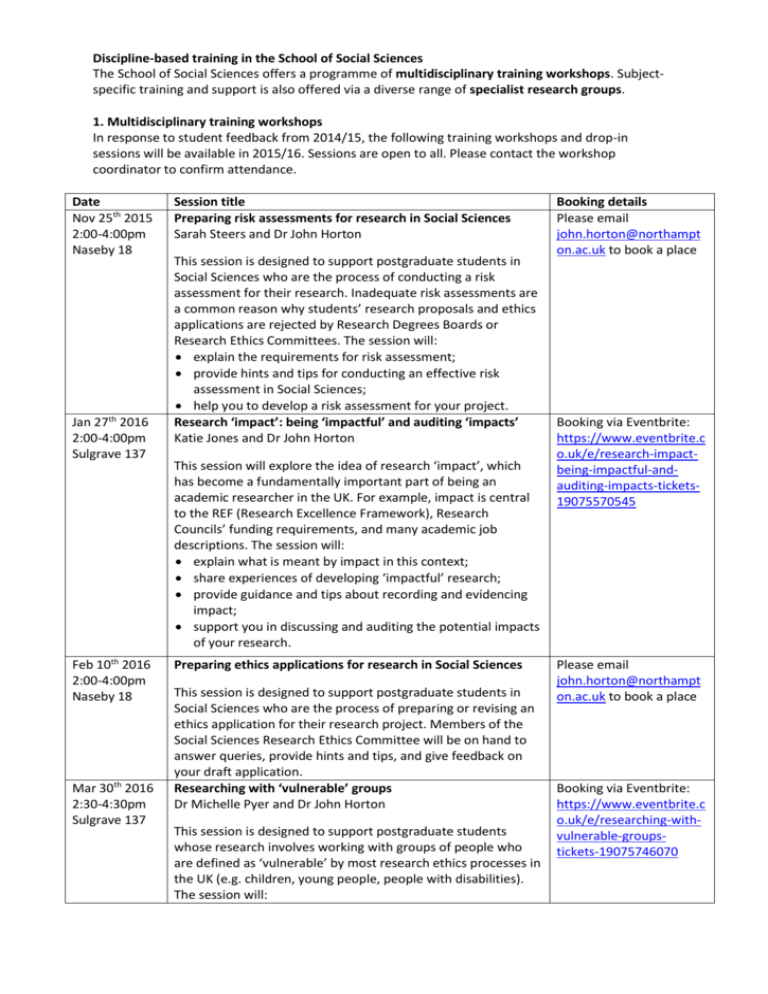
Discipline-based training in the School of Social Sciences The School of Social Sciences offers a programme of multidisciplinary training workshops. Subjectspecific training and support is also offered via a diverse range of specialist research groups. 1. Multidisciplinary training workshops In response to student feedback from 2014/15, the following training workshops and drop-in sessions will be available in 2015/16. Sessions are open to all. Please contact the workshop coordinator to confirm attendance. Date Nov 25th 2015 2:00-4:00pm Naseby 18 Jan 27th 2016 2:00-4:00pm Sulgrave 137 Feb 10th 2016 2:00-4:00pm Naseby 18 Mar 30th 2016 2:30-4:30pm Sulgrave 137 Session title Preparing risk assessments for research in Social Sciences Sarah Steers and Dr John Horton This session is designed to support postgraduate students in Social Sciences who are the process of conducting a risk assessment for their research. Inadequate risk assessments are a common reason why students’ research proposals and ethics applications are rejected by Research Degrees Boards or Research Ethics Committees. The session will: explain the requirements for risk assessment; provide hints and tips for conducting an effective risk assessment in Social Sciences; help you to develop a risk assessment for your project. Research ‘impact’: being ‘impactful’ and auditing ‘impacts’ Katie Jones and Dr John Horton This session will explore the idea of research ‘impact’, which has become a fundamentally important part of being an academic researcher in the UK. For example, impact is central to the REF (Research Excellence Framework), Research Councils’ funding requirements, and many academic job descriptions. The session will: explain what is meant by impact in this context; share experiences of developing ‘impactful’ research; provide guidance and tips about recording and evidencing impact; support you in discussing and auditing the potential impacts of your research. Preparing ethics applications for research in Social Sciences This session is designed to support postgraduate students in Social Sciences who are the process of preparing or revising an ethics application for their research project. Members of the Social Sciences Research Ethics Committee will be on hand to answer queries, provide hints and tips, and give feedback on your draft application. Researching with ‘vulnerable’ groups Dr Michelle Pyer and Dr John Horton This session is designed to support postgraduate students whose research involves working with groups of people who are defined as ‘vulnerable’ by most research ethics processes in the UK (e.g. children, young people, people with disabilities). The session will: Booking details Please email john.horton@northampt on.ac.uk to book a place Booking via Eventbrite: https://www.eventbrite.c o.uk/e/research-impactbeing-impactful-andauditing-impacts-tickets19075570545 Please email john.horton@northampt on.ac.uk to book a place Booking via Eventbrite: https://www.eventbrite.c o.uk/e/researching-withvulnerable-groupstickets-19075746070 May 25th 2016 2:00-3:00pm Sulgrave 137 explain what is meant by ‘vulnerability’ in this context; provide a space to share experiences of conducting research with vulnerable participants; provide guidance and tips about developing research strategies and ethics applications for research with vulnerable participants. We invite attendees to tell us about the groups that they are working with, and via a workshop-based approach we will seek to identify a range of strategies to support researchers in planning and undertaking their project work. Open Access in the REF: A review Dr Miggie Pickton and Nick Dimmock HEFCE have stated that certain research outputs must be made available in an open access form if they are to be eligible for submission to the next REF. What does this mean for you and how can you make sure you are compliant? Comprising a presentation covering the key points of HEFCE’s open access policy, followed by an opportunity for questions and discussion, this session will be of interest to anyone who aspires to submit their research to the next REF. Booking via Eventbrite: https://www.eventbrite.c o.uk/e/open-access-inthe-ref-a-review-tickets18999264311 2. Support and training offered by specialist research groups Given the broad range of subject areas with the School of Social Sciences, and the breadth of methodological approaches adopted, discipline-based training is also offered by specialist research groups. Their various provision is summarised below. All postgraduate students are very welcome to engage with Centre activities or contact the coordinators listed below. Group About the group CCBE (Collaborative Centre for Built Environment) Key expertise: urban design and urbanism planning and housing design for wellbeing heritage and culture of place making universities and place making built environment education Key expertise: children and young people’s everyday lives, mobilities and geographies conceptualising childhood and youth participatory, qualitative, visual and creative research with children and young people services, spaces and policies for children, young people and families children, young people and sustainable urbanism children and young people’s play, CCY (Centre for Children and Youth) Events planned for 2015/16 Annual programme of conferences, seminars, symposia and CPD opportunities – To be confirmed Contact Half-day conference on ‘new research with children, young people and families at the University of Northampton’, March 16th 2016, 14pm john.horton@northamp ton.ac.uk If you would like to present or attend, please email please email john.horton@northa mpton.ac.uk sabine.coadyschaebitz @northampton.ac.uk See: www.ccbe.co.uk/ See: www.northampton.ac.u k/research/researchcentres/the-centre-forchildren-and-youth-ccy CSAPP (Centre for the Study of Anomalous Psychological Processes) History IPSCJ (Institute of Public Safety, Crime and Justice) Law NIUA (Northampton Institute for Urban Affairs) popular culture and identities Key expertise: scientific study of Anomalous Psychological Processes extrasensory perception, psychokinesis and so-called psychic experiences exceptional states of mind (spiritual, mystical, and peak experiences among others) impacts of Anomalous Psychological Processes experiences on client wellbeing Key expertise: social and cultural histories, with expertise mainly relating to Britain in the long 18th century, although we also work on early-modern and early 20th-century England. histories of gender, consumption, material culture and crime histories of ideology, intelligence and security (e.g. Europe and North Africa in the 20th century, military intelligence, colonialism and postcolonialism, and Far Right politics) public engagement in history/heritage Key expertise: • criminal justice and public safety interventions • crime prevention, crime science and criminal justice practice • Strategic crime analysis • Community Engagement and criminal justice agencies Key expertise: • public Services Law • citizenship • Intellectual Property Law • International Terrorism Law • Equality law • Consumer Law • European integration • Corporate Social Responsibility • International Environmental Law Key expertise: • social innovation • community and social enterprises • social policy • community development housing Annual programme of meetings and events – To be confirmed Opportunities to engage with Level 7 research methods training Psychology – Contact chris.roe@northamp ton.ac.uk for details Seminar programme – all welcome to attend: http://blogs.northa mpton.ac.uk/history/ 2015/09/10/historyseminar-series-201516/ chris.roe@northampton .ac.uk matthew.mccormack@ northampton.ac.uk See: http://www.northampt on.ac.uk/research/resea rch-centres/history Annual programme of writing workshops and academic conferences – To be confirmed Annual programme of conferences, seminars and events – To be confirmed Annual programme of meetings and events – To be confirmed Annual programme of conferences and events – To be confirmed sarah.armstronghallam@northampton.a c.uk See: www.northampton.ac.u k/research/researchinstitutes/institute-forpublic-safety-crime-andjustice jim.davies@northampto n.ac.uk chris.durkin@northamp ton.ac.uk RRG (Radicalism Research Group) Social and Cultural Research in Psychology (SCRIP) SIRD (Sociology, International Relations, Development) Key expertise: radicalism, such as the development of populist and extreme right politics, and Islamism print and material cultures of radicalism and extremism historical and contemporary studies of extremist and radical political groups Key expertise: qualitative and critical research in psychology personal and social relationships impacts of policy and political context on subjectivity and lived experience transitions, including educational and professional transitions intersectionalities of class, race, ethnicity, gender, sexualities, abilities, etc mental health health and wellbeing family life education disability gendered violence bullying Key expertise: political and social theory (e.g. in relation to identity, Otherness, ethnicity, development, communication and social division in a global context) international political economy international relations local governance security and development in Africa networks and communications power, security and conflict Annual programme of conferences and events – To be confirmed paul.jackson@northam pton.ac.uk Regular programme of meetings and workshops – To be confirmed jane.callaghan@northa mpton.ac.uk Next meeting: Nov 17th 10-12, Fawsley building See: http://www.northampt on.ac.uk/research/resea rch-groups/social-andcultural-research-inpsychology-group-scrip Opportunities to engage with Level 7 research methods training Psychology – Contact jane.callaghan@nort hampton.ac.uk for details Annual programme of seminars and events – To be confirmed glyn.daly@northampton .ac.uk
